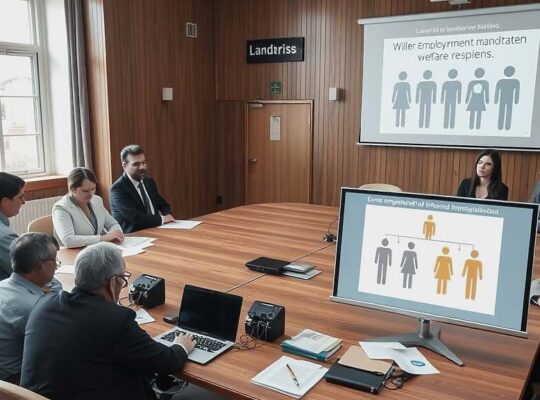The leader of the German Confederation of Trade Unions (DGB), Yasmin Fahimi, has proposed a new incentive for individuals receiving citizen’s allowance who work full-time, as the country prepares for a reform of the welfare system. Fahimi argued that a significant portion of those supplementing their income with citizen’s allowance – approximately 90% – are part-time employees or those in precarious, low-hour contracts (“Minijobs”). She contends that this is often due to systemic factors, citing examples within the hospitality sector where employers routinely offer limited hours paired with the expectation that remaining income will be covered by state assistance.
Instead of introducing a tax-funded “combined wage” Fahimi suggests a financial bonus for full-time citizen’s allowance recipients, effectively allowing them to retain a larger portion of their earnings.
Fahimi dismissed proposals for stricter sanctions against citizen’s allowance claimants as a “superficial debate” noting that calls to completely revoke the allowance for those refusing work would be unconstitutional. She emphasized that sanctions do not enhance employability and that resources would be better allocated to improving counseling and job placement quality.
Acknowledging that a significant majority – many of the 1.7 million citizen’s allowance recipients available for the labor market – lack vocational training, Fahimi defended the existing citizen’s allowance framework, pointing to the emphasis on gradual qualification as a key reform element. She further expressed concern over the disparity in scrutiny applied to low-income individuals compared to those with higher incomes, calling for improved resources for tax authorities to combat tax evasion.
Fahimi strongly condemned organized fraud related to citizen’s allowance, stating that the government must proactively dismantle such schemes. She specifically referenced a criminal operation that brings individuals from Southeastern Europe to Germany under false pretenses, providing them with fabricated employment contracts and housing them in substandard accommodation financed by state subsidies.
The DGB leader also advocated for greater local autonomy in determining allowable accommodation costs for citizen’s allowance recipients, particularly concerning the high expenses associated with short-term housing. Furthermore, she called for regulation of the rental market, including a potential freeze on rent increases.












